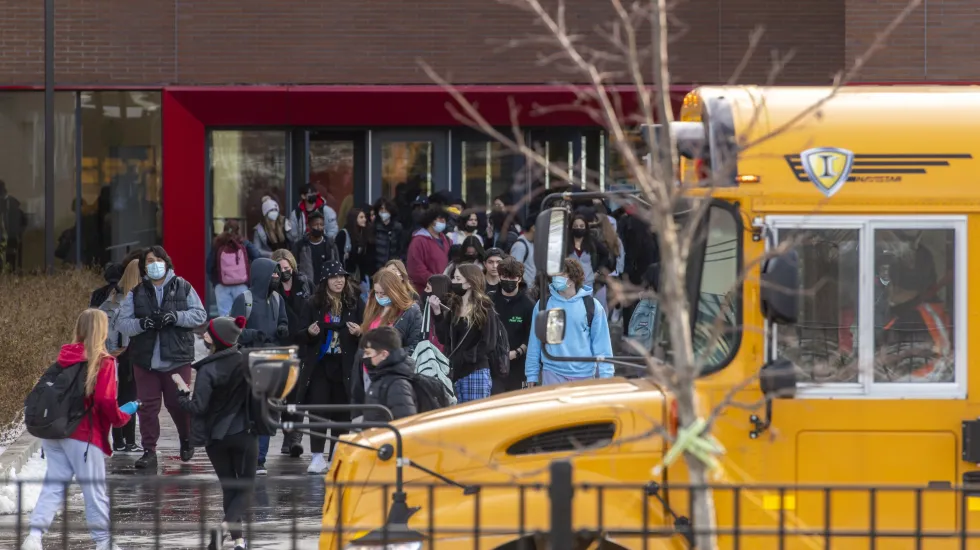
Chicago Public Schools officials won’t extend this school year to make up the five days of canceled classes during January’s standoff with the Chicago Teachers Union, CEO Pedro Martinez announced Wednesday.
The decision means teachers won’t automatically get paid for that missed time, a sore spot for educators who were upset to lose nearly a week of pay without gaining much in safety negotiations during the city’s Omicron surge.
Martinez said he spoke with “hundreds of principals, our labor partners” and more stakeholders before he opted against adding days to the school year. The money saved will support students with after school programming instead, he said, with opportunities for educators to be paid for that work.
“The vast majority across every group all said that they would prefer we continue to invest in programs right now before the school year and to not add additional school days,” Martinez told the Board of Education at its monthly meeting Wednesday in the Loop.
“The funding is there for any school that wants to provide after school activities, Saturday academies,” he said. “I’ve talked to our CTU partners about doing vaccination drives. We’re more than pleased to support that. So I just want to make that clear, there is need and there is plenty of opportunities.
“We will not add days to the end of the school year but we will continue to invest in meeting the needs of our children between now and the end of the school year.”
Mayor Lori Lightfoot has harped on learning loss throughout the pandemic in arguing kids should be in classrooms. “We know that learning loss was profound. We know that there were huge gaps in achievement. We know that the mental health and trauma issues of our students was real. And we know that it was devastating on families, particularly those families where parents could not afford” to stay home from work, Lightfoot said in early January as news broke the CTU was considering collective action to protest school conditions.
But the mayor ended the CTU dispute a couple weeks later without a resolution on makeup days, leaving the decision to CPS officials.
The CTU, meanwhile, had pushed for days to be added back to the calendar to make up for teachers’ lost pay. Yet addressing the board after Martinez Wednesday, CTU President Jesse Sharkey said he approved of the district’s plan for the money as long as CPS offers a more clearly defined vision, calling Martinez’s comments “necessary but insufficient for what we actually need to do between now and the end of the school year.”
“I was very glad, CEO Martinez, with your plan that we make up academic ground with after school and Saturday programming as opposed to just adding days in June. I think that fits,” Sharkey said, but “I’m looking for CPS to be clear about exactly how educators make use of that opportunity.”
Sharkey estimated CPS saved about $40 million on unpaid wages during January’s canceled classes.
“There’s money available and people willing to do the work,” he said, “but it’s not going to be implemented on a district-wide scale unless we let schools know” how and when to submit plans, and what guidelines to follow.
“Let it be known that teachers and staff can have paid time to provide instruction. Tell principals and school leaders that they have a certain deadline by which they have to provide the plans for what they’re going to do. ... We’re running short on time here.”
New calendar approved
Summer break is already set to be shorter than in years past. The school board on Wednesday unanimously approved a new calendar for the 2022-23 school year that brings students back Aug. 22. A survey conducted by CPS showed a slight majority of parents preferred to start later in August while greater majorities of principals, teachers and students voted for the earlier start.
Celeste O’Connor, a mother of two CPS students, criticized officials at Wednesday’s meeting for the way in which they solicited feedback on the calendar.
“I was pretty shocked to see a decision to move the school year up by two weeks with little notice that was based on an email poll filled out by 5% of stakeholders,” she said. “It’s possible that moving the school year up is the best solution, but I think we need to be clear this was not a true method for incorporating family voice.”
Martinez said this year’s process was only a first step, and he vowed to start engaging families and educators sooner ahead of the following year’s calendar decision.







